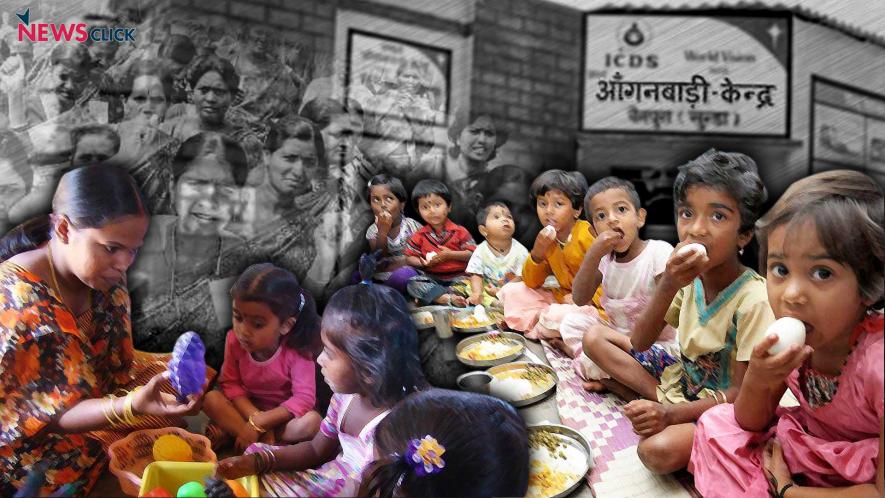Cash Instead of Ration for Mothers, Children Will Weaken ICDS, say Activists

Newsclick Image by Nitesh Kumar
Soon, the Ministry of Woman and Child Development (WCD) will transfer cash into the Jan Dhan accounts of pregnant and lactating mothers instead of providing them and their children under three with rations and nutritional supplements in Aanganwadis.
The take-home rations (THR) scheme for supplementary nutrition, under the Integrated Child Development Services (ICDS) programme, is critical for preventing child and maternal mortality, child malnutrition, and stunted growth.
The ministry has taken this decision even though a recent study, commissioned by the Niti Aayog and the Department of Food of the Union government, found that substituting cash for food grains under the Public Distribution System (PDS) had failed when tried in three Union Territories.
It is reported that the cash transfer proposal is based on a recent report prepared, ironically, by Niti Aayog on “Reforming Take Home Rations (THR) under the ICDS Scheme”.
The main reason given for substituting take-home rations (THR) with cash is the same as that put forward by advocates of dismantling the PDS for food grains – leakages in the supply and delivery of rations, so that beneficiaries don’t get their due .
But as the earlier study commissioned by Niti Aayog revealed, rather than plugging leakages in the system, direct cash transfer actually ended up depriving more than 40% beneficiaries of their entitlements. Less than 60% of cash reached beneficiaries in Chandigarh, Puducherry and Dadra and Nagar Haveli, where pilot projects of Direct Benefit Transfer (DBT) were introduced in the PDS.
Moreover, as activists and experts that Newsclick spoke to pointed out, the main reason for leakages in the THR is that it is centralised under private contractors.
“In some states, THR has not worked well, but this has been due to involvement of private contractors, such as Ponty Chadha in UP, and lack of political will,” said economist Reetika Khera.
“THRs work reasonably well in several states (for example, Tamil Nadu, Andhra Pradesh, Karnataka, etc). In Odisha, for instance, eggs are provided twice a week as THR. Instead of cracking the whip on the laggard states, the government is absolving itself of its duty by suggesting cash.”
There are a number of other problems with the cash transfer plan, which will be implemented in a phased manner, with the first phase covering 300 of the most backward districts.
“To begin with, this is illegal, as the National Food Security Act says that every pregnant and lactating woman and children aged 6 months to 3 years will be given one free meal a day. Cash is not food,” said Dipa Sinha, an activist with the Right to Food campaign.
“Implementation is a huge problem. Whatever experiments we’ve done with direct cash transfers in place of food so far have shown that our infrastructure is not in place for this to succeed. Problems range from not enough bank branches in backward and remote rural areas to connectivity issues. Besides, the transaction costs will be too high since they’re not giving a huge amount. If a woman has to travel every month to some branch 10km away to bring Rs 400, she will be spending quite a lot of money just going and coming.”
Another serious issue is inflation indexing – making sure that the cash transferred keeps pace with the rising prices due to inflation.
While there is a proposal to marginally increase the daily entitlement to Rs 8 from Rs 6 for a child, to Rs 9.30 from Rs 7 for pregnant and lactating women, and to Rs 12 from Rs 9 for a severely malnourished child, it is doubtful that the transfers would rise as fast as the general price level.
“They are saying they’ll increase the per capita allocation for THR, but look at how it’s been increasing. The last time it was revised was in 2011, so for 6 years it was the same. Look at old-age pensions for example; the central contribution has been Rs 400 for 10 years now. But the prices have been rising, so the value of the transfer is going down,” said Sinha.
Although there are calorie norms that the government has to stick to, without up-to-date inflation indexing, the cash won’t be able to buy as much as it is supposed to.
Another major practical problem with handing over cash instead of food to mothers is that there is a high chance it will be spent on other things instead of the required nutritional food, because women may not exercise control over the money.
“When it comes in the form of food, there’s a greater chance it will go to the woman and child. In the form of money, it gets used for other expenses. The woman has less control over her cash, and there are pressures of many other kinds of expenditures on a poor family,” said Sinha.
Similarly, Khera said, “If cash is given in lieu of THR, the danger is that not only will its value dissipate over time due to inflation, but also that it will be shared by the entire family instead of being a guaranteed supplement for the person for whom it is intended, the child and the mother. It is also a violation of the NFSA.”
Currently, the THR scheme benefits around 4.6 crore infants and 1.9 crore mothers across the country. Given that it is meant for the prenatal and neonatal stage for mothers and children, it is indispensable for the growth and nourishment of children.
“The first 1,000 days of a child's life are the most crucial for tackling child under-nutrition,” said Khera.
“The move to cash transfers for children under three and for pregnant and lactating mothers suggests that the government is not serious about our children's future.”
As Sinha said, “This is tantamount to the government withdrawing its services, stepping back from its responsibility towards its most vulnerable citizens. This will amount to weakening of the ICDS.”
Get the latest reports & analysis with people's perspective on Protests, movements & deep analytical videos, discussions of the current affairs in your Telegram app. Subscribe to NewsClick's Telegram channel & get Real-Time updates on stories, as they get published on our website.
























